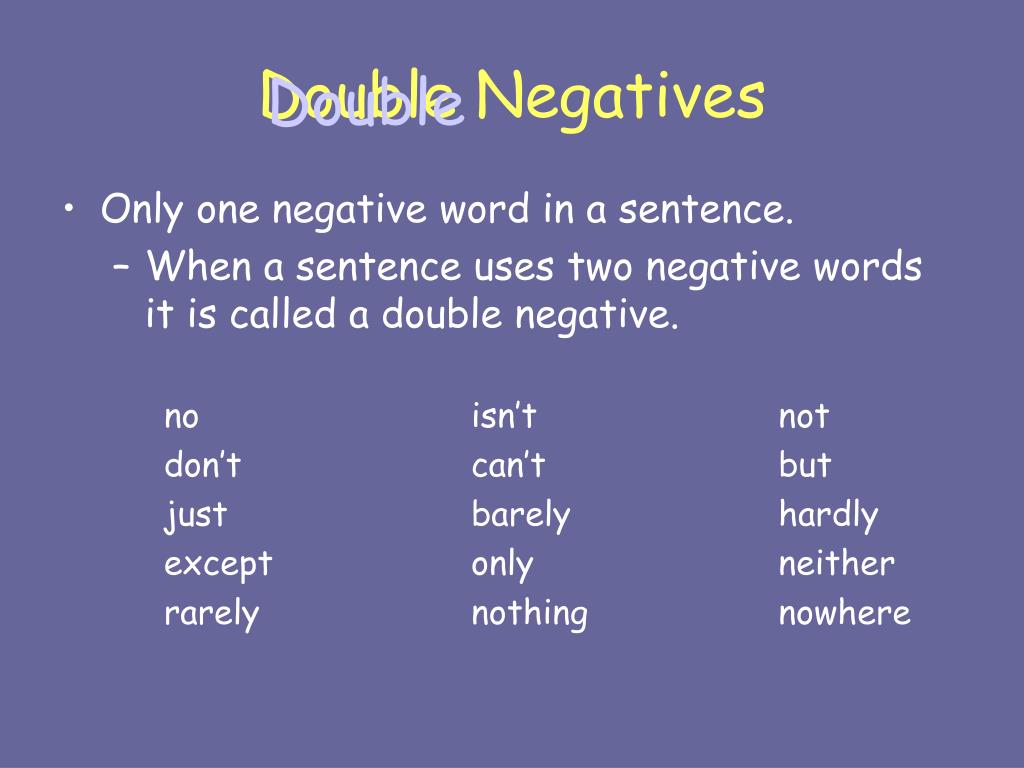
However, critics are right in that the double negative is no longer correct in more widely-spoken dialects of English, like the kinds you learn in English class.So in some dialects double negation is actually considered correct. English has many dialects, and each dialect is different grammatically. We agree with supporters when they say that there's nothing wrong with the double negative itself.What we thinkīoth supporters and critics of the double negative have a point. Supporters believe that it was because of grammar guides like this that double negation became seen as bad grammar. Two negatives, in English, destroy one another Here's what it said about the double negative: It went through many editions in the US, UK, and around the world, and was respected by famous writers such as Edgar Allen Poe and Charles Dickens. Lindley Murray's English Grammar was especially influential. Shakespeare in Richard IIIĪccording to supporters, the reason the double negative became incorrect grammar is because of English grammar guides from the 18th century. Many cases of it have been found in Old English and famous writers in the past used double and even triple negatives. Supporters will also point out that double negation has a long history in English grammar. For example, no native English speaker would hear "I didn't steal nothing" and think it meant "I did steal something." So the double negative makes sense. Supporters say that the double negative does make sense. However, if you read more into this topic, you'll find some support for the double negative. "He doesn't know nobody" means "He knows somebody."."I didn't steal nothing" actually means "I stole something.".So people who use double negation are actually making positive statements! It's like in math: When you multiply two negative numbers, you get a positive number, not another negative one. In their opinion, double negation doesn't make sense. Most English textbooks, teachers, and educated native speakers will say that you can only make a negative statement with single negation. Neanche per scherzo! – Don’t even joke about it! / Forget it!Ī final note, to watch out for the false negative finché non, which isn’t a negative at all! It means ‘until’ or ‘as long as’.So does English actually have two ways to make a negative statement: single and double negation? Or is one correct and the other incorrect? This depends on who you ask! The case against double negation Neanche per sogno! – Not even in your dreams!


There are some common negative expressions which can be useful to learn, here is a selection: It is not unusual to use three or four negatives in one sentence, such as this:įlavia non dice mai niente a nessuno – Flavia never says anything to anyone Non l’ho mica detto! – I didn’t say it at all! Non ho più sete – I am not thirsty anymore Non siete ancora arrivati? – Are you not there yet? Non … più – no longer, no more, not anymore There are other common expressions, such as Non ho né la sciarpa né i guanti, ho freddo! – I haven’t got a scarf or gloves, I’m cold!

Non mi va di studiare né latino né matematica – I don’t feel like studying Latin or Maths Non mi ha nemmeno risposto – He didn’t even answer me Non andiamo mai in vacanza – We never go on holiday Non guardo mai la television – I never watch television Non c’è nessuno a casa – No one is at home Non sente nulla – She doesn’t hear anything Non voglio mangiare niente – I don’t want to eat anything You can use the Italian word for ‘not’ – non– in front of any of these negative expressions. Neanche, nemmeno, neppure – not even, neither Nessuno – nobody, no one, anybody, anyone However, in Italian you do use double negatives, or even triple or quadruple negatives!įirst let’s look at some common negative expressions. We don’t say ‘I didn’t do nothing’, or ‘I didn’t see nobody’. In English, the grammar rule is to only use one negative word in a sentence.

You may also know that you add non before a verb to make a negative sentence, so if you wanted to say ‘I don’t want an ice cream’ you would say non voglio un gelato. In Italian, you might already know the word for ‘no’ – no (make sure you say it with an Italian accent!). When you’re talking in any language, it’s good to be able to say ‘I don’t want that’, or ‘I didn’t do that’.


 0 kommentar(er)
0 kommentar(er)
